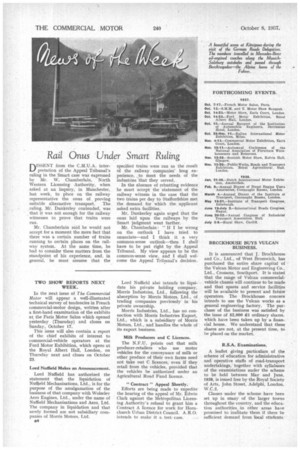Rail Onus Under Smart Ruling nISSENT from the C.M.U.A. inter
Page 38

If you've noticed an error in this article please click here to report it so we can fix it.
pretation of the Appeal Tribunal's ruling in the Smart case was expressed by Mr. W. Chamberlain, North Western Licensing Authority, when asked at an inquiry, in Manchester, last week, to place on the railway representative the onus of proving suitable alternative transport. The ruling, Mr. Dunkerley contended, was that it was not enough for the railway witnesses to prove that trains were run.
Mr. Chamberlain said he would not accept for a moment the mere fact that there was a certain number of trains running to certain places on the railway system. At the same time, he had to consider these matters from the standpoint of his experience, and, in general, he must assume that the specified trains were run as the result of the railway companies' long experience, to meet the needs of the industries that they served.
In the absence of rebutting evidence he must accept the statement of the railway witness in the case that the two trains per day to• Staffordshire met the demand for which the applicant asked extra facilities.
Mr. Dunkerley again urged that the onus laid upon the railways by the Smart judgment went further.
Mr. Chamberlain: " If I be wrong on the outlook I have tried to enunciate—and I think it a very common-sense outlook—then I shall have to be put right by the Appeal Tribunal. My view appears to be the common-sense view, and I shall welcome the Appeal Tribunal's decision.




























































































